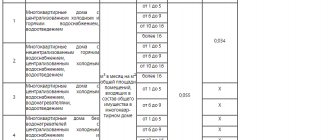Consequences of having debt to pay for housing and communal services
When debts arise for utility services, various consequences can occur. Among them are:
- accrual of penalties;
- seizure of property;
- restrictions on the disposal of real estate;
- introduction of a ban on travel outside the country;
- forced eviction of the debtor.
Pernicious violators face legal action.
Find out in more detail what the consequences of debt on utility bills are.
Can utility workers turn off the sewer system?
Many citizens are interested in whether sewerage can be blocked for debts. The thing is that in the current version the direct ban on turning off the sewer system has been abolished. In this regard, management companies (MCs) that collect payments are now threatening defaulters with suspension of the resource supply.
It states that the only way to influence malicious debtors and non-payers of housing and communal services is to limit or suspend water drainage and water supply.
At the same time, in search of an answer to the question of whether housing and communal services can turn off sewerage, it is worth considering that the above-mentioned resolution contains an important condition, according to which the suspension of any type of utility services should not:
- damage the common property of residents of an apartment building;
- violate the rights of other owners, including the suitability of residential premises.
Therefore, if a consumer doubts whether the sewerage system in the house was legally turned off, you can go to court to stop interfering with the sanitary and technical condition of the apartment building equipment.
Blocking sewerage for debts
Is shutting off sewerage legal? The topic of whether shutting off sewerage services due to debt is legal is quite relevant, since it does not have a clear definition of what is good and what is bad. Of course, the debtor must understand that in any case he will not go unpunished, so it is advisable to collect the amount right now to pay off the debt. But sometimes residents can go the other way, hiring lawyers and lawyers who will find arguments in favor of the fact that disconnection for non-payment of sewerage is an illegal and even dangerous procedure. In some ways they are right, but let's look at these arguments:
According to the forty-seventh decree regarding the standard of habitability, installing a plug on a pipe immediately turns the apartment uninhabitable; Also attracting the attention of lawyers is norm thirty-six of Article of the LC.
Sewer shutdown procedure
The management company cannot turn off the sewer system for a single failure to pay utility bills. In addition, she must warn the debtor about such an intention.
Restriction of water disposal without a court decision can be made no earlier than twenty days after delivery of a written warning, if the defaulter does not repay the debt before this time.
If the debtor does not take any action to pay the bills, the management company has the right to limit or suspend drainage.
In accordance with clause 119 of the “Rules for the provision of utility services...”, approved by Decree of the Government of the Russian Federation dated 05/06/11 No. 354, the contractor, in the event of absence or incomplete payment by the consumer for a utility service, has the right, after a written warning (notification), to limit or suspend its provision in the following order:
- send a warning (notification) to the consumer-debtor that in case of failure to repay the debt for payment of utility services within 20 days, the provision of such services may be first limited and then suspended (if there is no technical possibility, the restrictions may be suspended without it). The warning (notification) must be delivered to the debtor against signature or sent by registered mail (with acknowledgment of receipt) or included in the payment document for utilities the text of the corresponding warning (notification) or in another way;
- If the consumer fails to repay the debt within the period established in the notification, the contractor introduces a restriction on the provision of utility services (if technically possible);
- If the debt is not repaid after 10 days from the date of introduction of the restriction, the contractor may suspend the provision of utility services, with the exception of heating, and in apartment buildings, also with the exception of cold water supply. If it is not technically possible to introduce a restriction, then suspension is possible immediately after the expiration of the period specified in the notification.
Since the legislation does not separately stipulate at what amount of debt the sewer plugs are installed, this allows the management company to determine the monetary value independently.
Blocking sewerage for debts
A revolutionary step in this direction was the invention that makes it possible to install special plugs on the sewer riser of the debtor's apartment without going inside it. Remember that when you remove the blockage with your own hands, there is a high probability of malfunction of the common riser. Therefore, weigh all the pros and cons, and if the former still outweigh, then proceed.
The problem of non-payment of utility bills by debtors is dealt with strictly. If the user does not heed the warnings, he is given plugs. The legality of restricting water disposal in this case is undeniable. The company has every right to block users from services for which they do not pay. Few people are involved in charity in our country, especially when it comes to the uninterrupted operation of the sewerage system. Maintaining this system is difficult and expensive, and no one likes to work for free. The main impetus for the introduction of this method was the fact that almost all debtors do not allow housing and communal services representatives into their apartments, who could seal the water supply pipes. Naturally, employees of the management company and water utility services can only enter the apartment with the consent of the owner, so the situation could not be resolved for a long time.
This state of affairs provided management companies with the use of so-called “plugs” the opportunity to suspend or limit water disposal to debtors. However, the question should be asked differently: to what extent does this method of influencing the category of non-payers of utility services concern the interests and rights of other residents living in the house?
The second system for blocking sewers, “Kit”, consists of: a probe, a control panel and a camera. Its advantages include:
- the presence of LED bulbs - this makes it easier to find an apartment;
- the presence of a compact control panel - thanks to this, there is no need to rent a car for specialists.
These plugs sometimes cause more problems for the debtors' neighbors than for the debtors themselves. Sewage through the window or urine from the ceiling and just the constant stench is such a pleasure. Any service provided by housing and communal services must be paid for. If you don’t do this, then they can simply turn it off, and what should you do then? It will be impossible to live. This is especially true for drainage. Limiting water drainage is a real disaster, because it will be impossible to remove water from the sink, bathtub, or toilet. Naturally, using all the plumbing will be much more difficult than if the system was functioning normally.
In the dispute about the legality of installing “plugs” on the sewer system for utility debtors (aka “plugging”), it seems that the end has been reached. In March of this year, the Supreme Court outlined its position.
Our people have no conscience. When operating apartments, they use all the services that utility services can provide them. Many, of course, pay, and try to do it regularly, if the amounts in the bills are available, but they never allow a huge debt to appear. Others prefer to believe that they are owed everything, and housing and communal services are completely free for them.
But if for one reason or another you cannot pay off the debt and apply to the Criminal Code for unblocking, then you have only one option left - disconnecting the toilet from the common riser and partially dismantling the common riser.
It should be noted that sewerage cannot be turned off for the simple fact of non-payment of utilities. This is due to the fact that the period for non-payment of debt must be no less than three months. The fact is that the owner carries out all manipulations from his apartment. Conclusion Undoubtedly, the formation of debt is an unpleasant phenomenon not only for service companies, but also for the owner of the premises. The use of various measures by utility services to collect accumulated amounts is quite justified.
But every year local authorities are increasingly beginning to have a positive attitude towards this strict measure. As a result, it is used more and more often.
Residents in apartment buildings are required to pay monthly utility bills for the use of housing and communal services on time and in full. However, sometimes you come across unreliable citizens who do not pay their utilities for months, and some for years.
Sewer blocking procedure
Perhaps someone is interested in learning more about how sewers are blocked for debts. First of all, the specialist determines where the central drainage riser is located in the house. He inserts a plug into it and advances it to the problem apartment. After this, a special outlet is installed, with the help of which the problem area is cut off.
At the same time, the central riser remains open. This makes it possible to install a block that does not interfere with drainage from other rooms in the house, but isolates only the apartment whose residents have accumulated debts.
Many debtors would like to find out whether they have the right to put a cap on the sewer when they owe a debt on utility bills. If we look at the legal norms, it becomes clear that such a procedure is completely legal.
In this situation, an agreement is drawn up to limit water drainage by installing a plug. The management company may not even resort to legal proceedings, since this is not necessary. She has the right to put a cap on the sewer without a court decision.
What to do if the sewer is blocked for debts
If there is a large debt and the sewerage system is turned off, the consumer will need to pay in full. If the amount is too large for a one-time repayment, restructuring is available.
To do this, contact the utility company and write an application addressed to management. The appeal indicates why the debt arose, and also asks for permission to pay the amount in installments over several months.
It is not profitable for an enterprise to get involved in litigation, so it makes concessions. If the payment schedule is followed, sanctions may not be applied in the future.
What to do if the drainage system is blocked
Any management company is ready to accommodate a citizen before suspending water supply if he intends to pay off the debt. For example, the parties may agree to pay the accumulated amount in stages by concluding a restructuring agreement.
If for some reason it was not possible to reach an agreement and the service has already been suspended, you need to know what to do if the sewer system is blocked for debt.
You should not remove the plug yourself using technical tools, as this can lead to flooding of your neighbors.
In addition, such actions can be qualified as an administrative offense, and sometimes even fall under the law.
The only correct course of action in this case would be to pay off the debt.
Find out in more detail how debt restructuring for housing and communal services occurs.







